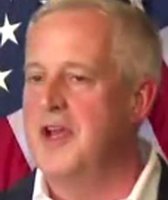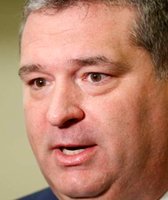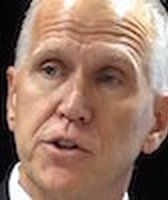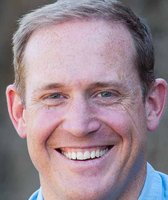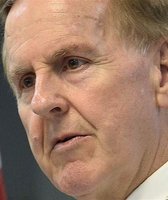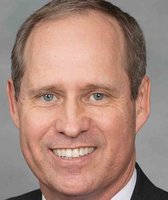Stand up for the facts!
Our only agenda is to publish the truth so you can be an informed participant in democracy.
We need your help.
I would like to contribute
The Public Facilities Privacy & Security Act, commonly known as House Bill 2 or HB2, was passed by the General Assembly and signed into law by Gov. Pat McCrory on March 23.
Since then it has attracted criticism from businesses and liberal groups, but support from social conservatives.
The law is most well-known for mandating that people use the bathroom of the gender on their birth certificate, which would stop transgender people from using the bathroom of their gender identity. It also sets statewide nondiscrimination policies for both employment and service in public accommodations; the policies don’t include protections for gay or transgender people.
It also forbids cities and counties from making rules that differ from state law on discrimination and bathroom issues, as well as on minimum wage and other labor-related topics.
Finally, the law says North Carolinians may no longer file discrimination lawsuits in state courts – they may only use the more restrictive federal court system.
Here are the HB2 fact checks from PolitiFact and PolitiFact North Carolina in the four weeks since the law was passed. Find full-length articles at www.politifact.com/north-carolina.
"There are 31 other states and 10,000 other cities that have the same type of policies that we just passed."
-- Rep. Paul "Skip" Stam, N.C. House Speaker pro tem
We rated that claim Half True. Several parts of what HB2 does exist only in two or three other states. And North Carolina is the only state so far to have restricted bathroom access to the gender on your birth certificate, although several other states are considering similar bills.
But Stam said he meant just the part about a lack of discrimination protections for gay and transgender people. And on that, his point more or less stands. There are 29 other states, and probably even more than 10,000 cities, that also don’t protect gay and transgender workers.
"We have not taken away any rights that have currently existed in any city in North Carolina."
-- N.C. Gov. Pat McCrory
We rated that claim False. The new law did take away some existing rights.
It took away the right of people who are fired for discriminatory reasons to sue in state court. It took away the right of people who are treated or refused service in a discriminatory way to sue in state court. It took away the right of cities to require subcontractors to follow rules about discrimination and wages, and it nullified some existing city policies.
"Towns, cities and counties in North Carolina are still allowed to set stricter non-discrimination policies for their own employees if they choose."
-- N.C. Gov. Pat McCrory
We rated that claim Half True. Although McCrory sounded quite confident, his office never responded to explain his reasoning. And city leaders are not confident whatsoever. Mayors and government attorneys in Chapel Hill, Carrboro, Raleigh and Greensboro – all cities that had stricter policies than are in HB2 – said they’re afraid McCrory is wrong.
Part of the confusion stems from an oddly worded clause that employs seemingly circular logic. We asked three law professors who specialized in either employment law or constitutional law, and they were split. One said McCrory was right, and two said he was wrong.
"Will (HB2) threaten federal funding for public schools under Title IX? No, according to a federal court which has looked at a similar issue."
-- N.C. Gov. Pat McCrory
We rated that claim Half True. He’s right that a judge in Virginia said Title IX doesn’t protect transgender students. But he didn’t mention that the case is currently under appeal, and that the judge in the case has been accused of courtroom improprieties and could be removed.
This case is important because it’s the stance of the Obama administration that Title IX does apply to transgender students. North Carolina receives $4.5 billion in federal education funding that could be at risk if it violates Title IX.
Charlotte’s anti-discrimination ordinance would have "opened all bathrooms to all sexes at all times" if it hadn’t been overturned by HB2.
-- N.C. Lt. Gov. Dan Forest
We rated that claim False. Charlotte’s now-defunct ordinance, which was the inspiration for HB2, would not have opened all bathrooms to all sexes at all times. The ordinance itself said it wouldn’t apply to private clubs or any other businesses not open to the public.
There is disagreement on whether Charlotte would have opened bathrooms in public accommodations to "all sexes at all times." But even if it would have, Forest’s claim is still wrong.
"The city of Charlotte passed a bathroom ordinance mandate on every private-sector employer in Charlotte."
-- N.C. Gov. Pat McCrory
We rated that claim Mostly False. McCrory said it on NBC’s "Meet The Press," echoing the claim by Forest listed above. It was rated Mostly False for many of the same reasons – namely, that the ordinance would not have applied to every private business, just those offering public accommodations.
But McCrory also went on the mention the YMCA by name, saying it would have been affected by the law. The Charlotte city attorney wasn’t able to refute that claim, and the YMCA couldn’t be reached for comment.
North Carolina spent "almost as much as it spends on government rape crisis programs in a year" to convene a special session for HB2.
-- LGBT Progress
We rated that claim Mostly False. It wasn’t technically incorrect, due to careful wording, but it was highly misleading.
The state spent $42,000 on the special session and spends $45,000 annually on government-run rape crisis programs. But the vast majority of such work in North Carolina is done by charities, and the state government gives those charities nearly $3 million a year to carry out their mission.
"There have not been any public safety issues" in cities that allow transgender people to use the bathroom of the gender they identify as.
-- Equality NC Director Chris Sgro
We rated that claim Mostly True. Sgro said that although opponents of transgender-friendly bathroom laws often cite fears of sexual predators, those fears aren’t based in fact.
We searched far and wide for examples that fit three categories: 1. someone convicted of committing a sex crime AND 2. in the opposite gender’s bathroom or locker room AND 3. in a place that lets transgender people use the bathroom they feel most comfortable with.
We couldn’t find any in the United States, and conservative groups also couldn’t point to any. There have been a few recent allegations, and we gave some weight to those, but people in America are considered innocent until proven guilty. We also found one case of a Canadian who took advantage of transgender-friendly rules in Toronto to commit rape and has been convicted, facing life in prison.
"Attorney General Roy Cooper refuses to do his job" by not defending House Bill 2 in a lawsuit.
-- N.C. Senate President pro tem Phil Berger
We rated that claim Half True. Berger is right that North Carolina law says the attorney general must defend the state in all legal actions, and that it doesn’t provide any exemptions to that duty.
However, we talked to law professors, read scholarly articles and watched an ethics training session from a recent National Association of Attorneys General meeting to learn more about the intricacies of this argument. We found the legal community overwhelmingly agrees that attorneys general do, actually, have authority to decline to represent the state in certain cases.
The Human Rights Campaign is "more powerful than the NRA."
-- N.C. Gov. Pat McCrory
We rated that claim False. We looked at a number of ways to measure the power of special interest groups, and in every single one the NRA far outshone the Human Rights Campaign.
In revenue, spending, membership, magazine subscriptions, online reach, Google searches and official government mentions, the NRA wins each by at least a factor of 2:1 and sometimes as much as 10:1.
Our Sources
Please read the individual articles at www.politifact.com/north-carolina for lists of sources.

